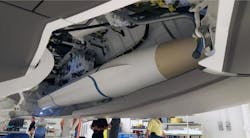Lockheed Martin to equip the F-35A combat jet with AARGM-ER anti-radar electronic warfare (EW) missile
EGLIN AIR FORCE BASE, Fla. – U.S. Air Force electronic warfare (EW) experts are ready to enable the F-35A joint strike fighter to attack and destroy enemy air-defense radar installations.
Officials of the Air Force Life Cycle Management Center at Eglin Air Force Base, Fla., announced a $9.3 million contract last week to the Lockheed Martin Corp. Aeronautics segment in Fort Worth, Texas, to integrate the U.S. Navy Advanced Anti-Radiation Guided Missile-Extended Range (AARGM-ER) into the F-35.
The AGM-88G AARGM-ER is a new and advanced radar-killing missile designed to enable U.S. jet fighter-bombers suppress enemy air defenses preceding bomber attacks.
Fitting the AARGM-ER to the Air Force version of the F-35 will enable the aircraft to join the Navy EA-18G Growler carrier-based electronic warfare jet in carrying out air-defense radar suppression missions.
The AARGM-ER is an advanced and extended-range version of the High-Speed Anti-Radiation Missile (HARM). It is a new variant of the AGM-88E missile that equips Navy carrier-based fighter-bombers and electronic warfare jets. HARM was a replacement for the AGM-45 Shrike anti-radiation missile, which was in service from 1965 to 1992.
AARGM is a supersonic, medium-range, air-launched tactical missile compatible with U.S. and allied strike aircraft. The AARGM-ER missile features several upgrades to the AGM-88E that focus on extending the weapon's operational range and survivability.
The AARGM-ER replaces the missile's rocket motor and tail to increase its range, while keeping the sensors and electronics of the AARGM-88E, which are being upgraded in a separate project. The AARGM-ER missile is scheduled to achieve initial operating capability (IOC) and start being fielded to Navy squadrons in 2023.
AARGM provides the U.S. Navy, U.S. Marine Corps, Italian air force, and now the U.S. Air Force with a weapon system for engaging and destroying enemy air defenses and time-critical, mobile targets. The AARGM also has precise Global Positioning System (GPS)/inertial navigation system (INS) guidance and network-centric connectivity.
The AARGM offers advanced signal processing and improved frequency coverage, detection range, and field of view, compared to earlier versions of the HARM system. It has time-critical standoff strike with supersonic GPS/INS point-to-point or point-to-millimeter-wave-terminal guidance.
It also has missile impact zone control to prevent collateral damage through tightly coupled, digital terrain elevation database-aided GPS/INS, as well as counter-emitter shutdown through active millimeter-wave-radar terminal guidance.
The F-35 with its advanced avionics is a fifth-generation single-seat, single-engine, all-weather stealth multirole jet fighter-bomber designed to perform ground attack, aerial reconnaissance, and air defense missions. It is one of the most advanced combat jets in the world.
For more information contact Lockheed Martin Aeronautics online at www.lockheedmartin.com, or the Air Force Life Cycle Management Center at www.aflcmc.af.mil.

John Keller | Editor-in-Chief
John Keller is the Editor-in-Chief, Military & Aerospace Electronics Magazine--provides extensive coverage and analysis of enabling electronics and optoelectronic technologies in military, space and commercial aviation applications. John has been a member of the Military & Aerospace Electronics staff since 1989 and chief editor since 1995.

